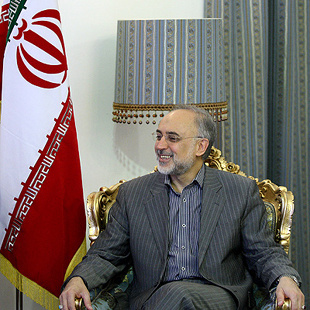Salehi’s Détente Mission in the Persian Gulf

 After his last week visits to Oman and Qatar, Iranian Foreign Minister Ali Akbar Salehi continued his Middle East tour, making a one-day trip to the United Arab Emirates. This is amid the massive protests in Bahrain that have sparked the bitterest verbal fight between Iran and some members of the Persian Gulf Cooperation Council in recent years. Mas’oud Edrisi, former ambassador to Lebanon, elaborates on the significance of Salehi’s visit.
After his last week visits to Oman and Qatar, Iranian Foreign Minister Ali Akbar Salehi continued his Middle East tour, making a one-day trip to the United Arab Emirates. This is amid the massive protests in Bahrain that have sparked the bitterest verbal fight between Iran and some members of the Persian Gulf Cooperation Council in recent years. Mas’oud Edrisi, former ambassador to Lebanon, elaborates on the significance of Salehi’s visit.
IRD: What agenda is Salehi following in his Middle East tour? How do you see his chances of success?
ME: Clearly, de-escalation of tensions between the Islamic Republic of Iran and its neighbors on the southern coast of the Persian Gulf. Salehi has to work hard in his negotiations with Arab officials to resolve the recently emerged misunderstandings. Personally, I wish him success, but unfortunately, the Islamic Republic’s foreign policy was flawed regarding recent developments in Arab countries, particularly the popular uprising in Bahrain. Diplomatic visits are of course effective, but they should entail frank, transparent dialogue to bear fruit. Otherwise expecting the quarrel to soothe itself is naïve. Economic and cultural delegations can also help ease tensions. Iran should use its full capacity to resolve the issue, demonstrate that it has no intention to meddle in other countries’ domestic affairs, and to prove what Arab countries claim is either baseless or arises from misunderstanding.
IRD: The Egyptian FM Nabil al-Arabi was also visiting the UAE during Salehi’s trip. Can the new Egypt alleviate the bitter mood in Tehran-GCC members’ relationship?
ME: It’s difficult to call Tehran and Cairo friends, though clearly their relations are not as chilly as before. So I don’t think Egypt is now in a position to broker between Iran and Persian Gulf Arab states. Of course, officials from both sides have shown interest in resuming close ties after a thirty-year freeze, and normalization of ties with Cairo can shift the attitude of Persian Gulf littoral states towards Iran. But until then, there is little Cairo can do for or against Iran.
IRD: What other Arab countries might be the next destination for Salehi?
ME: I think the most important Arab country Iran should approach is Saudi Arabia. The Saudis’ role in regional and international developments is critical, and Tehran should intently seek resolution of misunderstandings with Riyadh.

